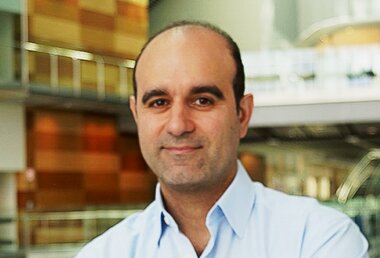6 September 2023
KHP speaks to Mr Foad Rouhani, the first surgeon to secure a Group Leader position at the world-leading Francis Crick Institute.
What is your role within King’s Health Partners?
I am a Reader in Liver Transplantation and Tissue Regeneration at King’s College London and an Honorary Consultant Transplant Surgeon at King’s College Hospital NHS Foundation Trust. I am also a Group Leader at the Francis Crick Institute, leading a basic science laboratory. We hope to eventually translate our research findings into novel therapies for patients and King’s Health Partners provides an excellent environment in which to do that.
Congratulations on your Group Leader appointment, please explain the role and the application process.
The Crick is the largest single biomedical research institute in Europe and supports upwards of 1,500 scientists across the whole spectrum of the life sciences. I am head of the Tissue Regeneration and Clonal Evolution (TRCE) laboratory which is composed of a multidisciplinary team of scientists and clinicians. My role is to direct a research programme which focuses on elucidating the biological mechanisms which are central to an organ’s regenerative capacity.
The application process for the Group Leader position was rigorous! It consisted of several stages including a written research proposal, a seminar to the entire Institute and formal interviews in the style of a viva voce.
How big an achievement is this, and what does it mean for your research moving forward?
I am particularly excited about how this position can further my research interests, but this is also a unique achievement in a couple of ways – I am the first clinician scientist from King’s College London and the first surgeon to secure a Group Leader position at the Crick. From a research perspective, the Crick’s vision and substantial support offer unrivalled opportunities to address major questions in fundamental biology and pursue longer term, high risk but high reward, projects. I look forward to enhancing King’s College London’s links to the Crick and my new position will drive opportunities for KHP clinicians who have an interest in pursuing a research career.
What is the potential for collaboration with King’s Health Partners, for example with Prof Dasgupta and the Academic Surgery programme?
One of the things I am most looking forward to is encouraging more surgeons to pursue basic science research projects. The hugely impressive Academic Surgery programme that Prokar has spearheaded provides the perfect partnership for us to develop a cadre of surgeon scientists within KHP. There are also opportunities to forge closer links between the clinical service and lab-based researchers through symposia such as ‘Medicine at the Crick’ and CrickMed, which organises exchange visits between scientists and clinicians.
What would be your top tips for any clinician scientists looking for similar Group Leader posts?
It is paramount that clinician scientists are relentless in the pursuit of their academic goals and to remain focused despite the inevitable setbacks along the way. Balancing clinical work with laboratory-based research is frequently challenging, particularly in surgical specialties, because our priority to patients must always be to deliver excellent clinical care.
I have found that aligning my clinical practice to my research interests has been instrumental in allowing me to successfully follow both the clinical and academic career paths concurrently. Lastly, throughout my career I have worked to establish a wide network of mentors who have provided invaluable advice to me at various junctures.
Mr Rouhani will be speaking at this year's KHP Annual Conference on Thursday 12 October - register here.
To learn more about the KHP Academic Surgery programme, visit its webpages here.





